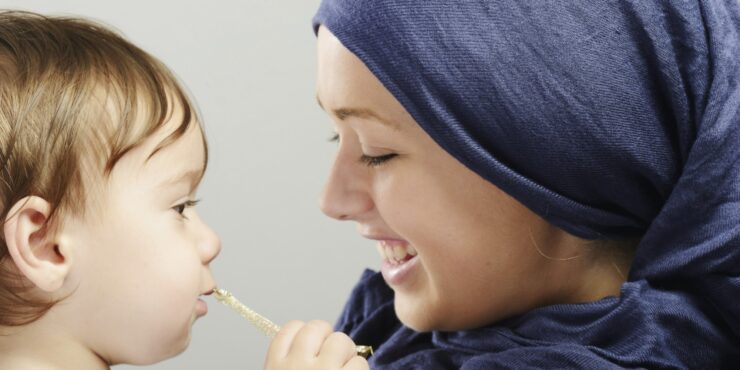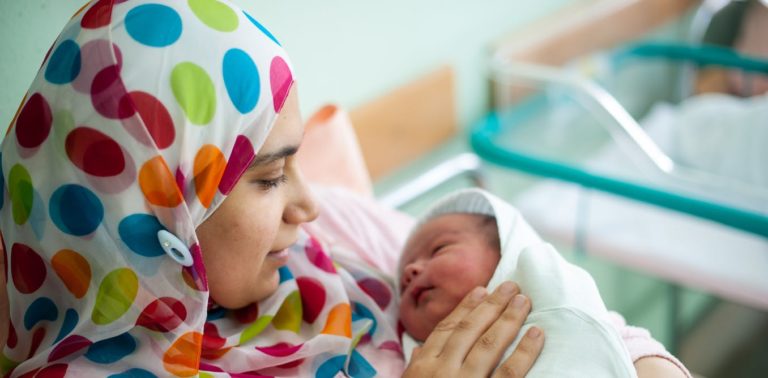For some mothers, Ramadan won’t feel complete without fasting.
Ramadan is a month of giving, and some women give twice over. No matter how often we are told that breastfeeding brings “x times more blessings to the mother than fasting”, or is more difficult than fasting, there will be nursing women who fast.
This simple and private act is apparently considered so subversive in many circles. The mother is told that she is endangering her baby, endangering her own health, not accepting her God-given feminine roles and trying too hard to be like men (also popular here is throwing in a point about how feminism is corrupting Islam), and for being arrogant to go against God’s mercy for having exempted her from fasting.
I’m not going to argue for or against pregnant or breastfeeding women fasting, because the jurisprudential opinions vary greatly, and we know our body and its limits the best. But I believe that pregnant or nursing women who fast are more in tune with their bodies and its needs than the average person, and put more care into nourishing and hydrating themselves in the night.

If we were too dehydrated, or if our babies seemed not to be moving or drinking enough, or if we were not pumping enough milk for our babies’ meals the next day, we would break our fast in a heartbeat.
I believe that the root of the hostile reactions towards these women is fear. The fear of the mystery of breastfeeding, the fear of our bodies’ immense capabilities and the fear that Muslim women don’t consider their condition a weakness but a strength.
Wait, this sounds familiar. Isn’t that why we fast in the first place?
We fast because it makes us feel weak. We feel tired, thirsty, hungry, cranky (I’m looking at you caffeine addicts), but our low blood sugar and headaches remind us that we’re only human with very real physical needs. We might go to different mosques and fast in different climates and for different lengths of daylight, but for many of us, these physical sensations are the only things that remain as a constant reminder that it’s a sacred month that is better than a thousand months.
The only people who are truly exempted from fasting are the very young and the very poor. Everyone else – travellers, the elderly, the sick, the menstruating, the breastfeeding – has to make up any missed days in Ramadan at another time, feed a poor person as compensation, and/or pay a penalty equivalent to a daily local price of a meal (2:184). The nature of the dispensation or penalty fee differs according to the different schools of jurisprudence.
What’s also interesting is that, in times and places where families could afford a wet nurse, they didn’t have to worry about these issues at all. The mothers could simply fast since their child’s right to breastmilk was being met from the wet nurse.
I might breastfeed and fast, but the day is too long, my five-month-old still depends completely on me for milk (although he’s been spacing out his feedings – in honour of Ramadan?) and I just get too thirsty.

As expected, when I mention this to various acquaintances, they start reminding me that taking care of my son and breastfeeding him is worship, and share like-minded memes from the social media accounts of Islamic scholars. I know they have good intentions, but it’s just as annoying when you’re told you don’t have to go to the mosque because the home is a better place of prayer for women, especially when they have children (another post for another day).
Instead, I took a more proactive approach to get into the Ramadan spirit. I precariously put up a banner in my window (outing yourself as a Muslim in this country feels like I’m living life on the edge), bought a huge box of dates, cut out all my snacks, and after my husband is done cooking iftar, we eat together in the evening. We’ve also set up some dates to iftar with different friends. While tarawih at the mosque is likely not possible where we are this year, I’m hoping to go to my neighbourhood mosque at least once when we go back to Singapore at the end of Ramadan.
Being a mother is hard. Parenting when you don’t have the energy is harder. I have loads of respect for women who seek spiritual fulfilment while giving of themselves. May God give us abundant health and strength to be able to care for our little ones. Ramadan kareem!

Fiqh rulings on fasting while pregnant or breastfeeding
The general idea is that pregnant and breastfeeding women must fast, and are only dispensed (rukhsa) if they are afraid it will harm themselves or their child.
According to the Shafi’i, Maliki and Hanbali madhhab, a pregnant or breastfeeding mother who attempts to fast and breaks it because she fears harming herself has to neither give food to the poor nor pay an equivalent amount (fidya). However, she has to pay it if she fears harm for only her children, because the fast is not an obligation for them.
According to the Hanafi madhhab, pregnant or breastfeeding women that break their fast out of fear of serious illness for themselves and/or their children do not have to pay any penalty at all.
One minority opinion is that they simply have to make up their missed fasts at another time, while another minority opinion also obliges them to feed the poor.
By Sya Taha.
